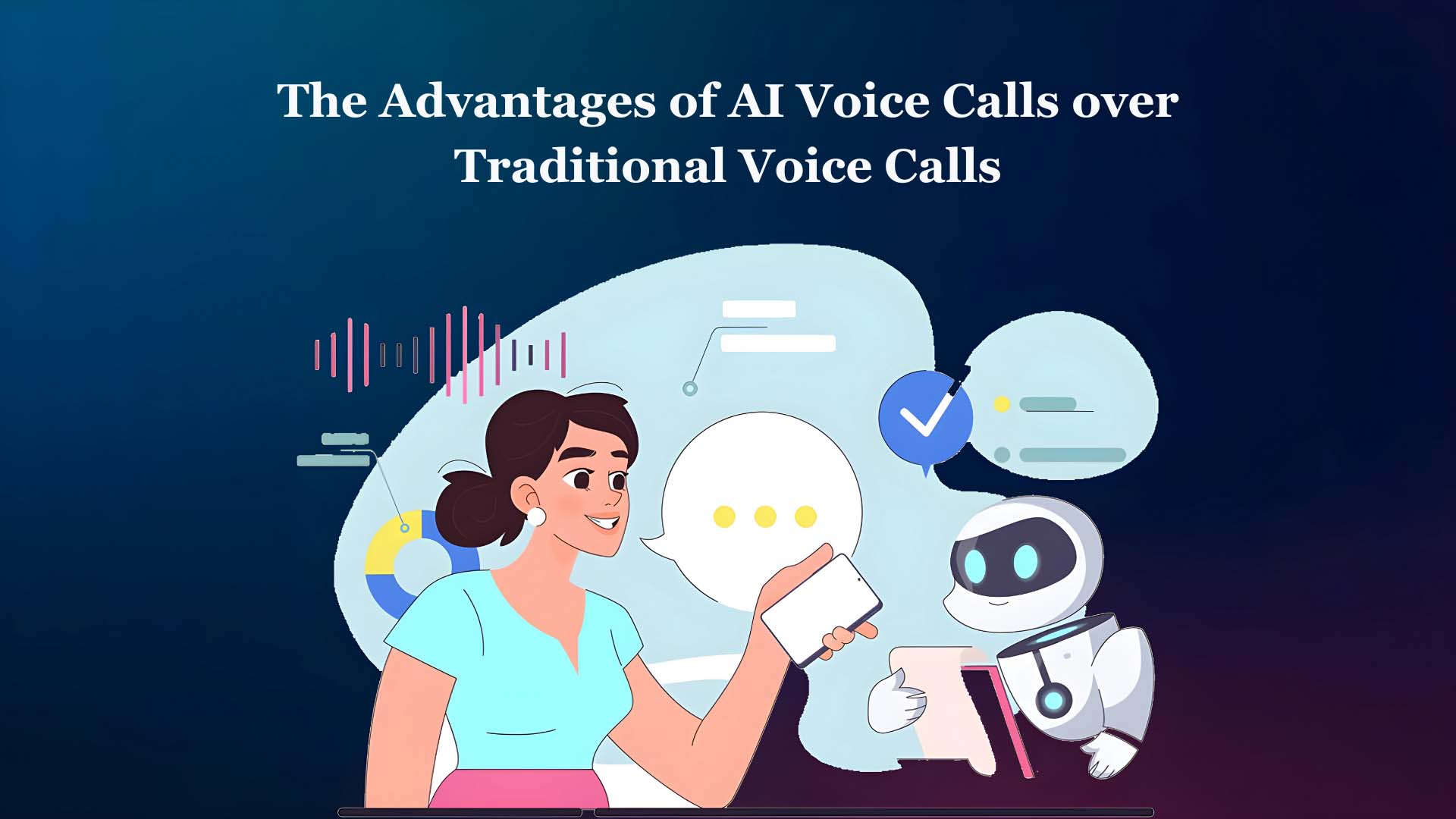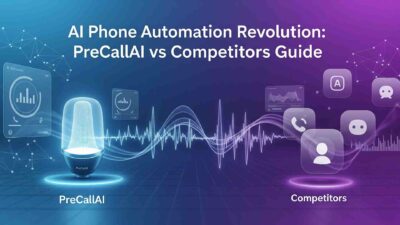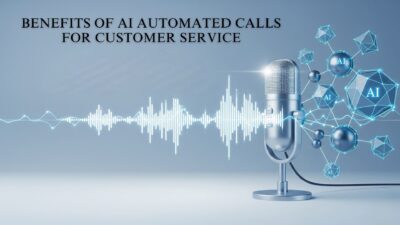TL;DR The landscape of business communication is undergoing a revolutionary transformation. As organizations worldwide seek more efficient, cost-effective, and scalable solutions, AI voice calls are emerging as a game-changing alternative to traditional communications. This shift isn’t about replacing human interaction entirely, but rather about leveraging artificial intelligence to enhance, streamline, and optimize voice-based communications across various industries.
Table of Contents
What Are AI Voice Calls?
AI voice calls utilize advanced artificial intelligence technologies, including natural language processing (NLP), machine learning, and neural speech synthesis, to conduct automated conversations that closely mimic human interactions. These systems can handle customer inquiries, schedule appointments, process orders, and provide support without human intervention, operating with remarkable efficiency and accuracy.
Unlike traditional IVR systems with their rigid menu structures, modern NLP voice systems understand caller intent in real-time, allowing customers to communicate naturally and receive instant, contextually appropriate responses.
Cost Efficiency: The Bottom Line Advantage
One of the most compelling advantages of NLP voice systems is their significant cost reduction potential. Traditional call centers require substantial investments in human resources, training, infrastructure, and ongoing operational expenses. NLP voice systems can reduce telephone handling costs by 40-60%, according to recent industry analyses.
Reduced Labor Costs
NLP voice systems eliminate the need for large teams of human operators, especially for routine inquiries and standardized processes. This doesn’t mean complete job displacement, but rather allows human agents to focus on complex, high-value interactions that require emotional intelligence and creative problem-solving.
Scalability Without Proportional Costs
Traditional call centers face the challenge of scaling operations during peak periods, often requiring temporary staff or overtime payments. NLP voice systems can handle unlimited simultaneous conversations without additional per-call costs, making them ideal for businesses with fluctuating call volumes.
24/7 Availability: Never Miss Another Opportunity
While human agents require breaks, sleep, and time off, NLP voice systems operate continuously without interruption. This round-the-clock availability transforms customer service from a time-bound function into an always-on capability.
Global Business Support
For companies operating across multiple time zones, NLP voice systems eliminate the complexity of maintaining staffed call centers in different regions. A single AI system can provide consistent service quality regardless of when customers call.
Emergency and After-Hours Support
Industries like healthcare, utilities, and emergency services benefit tremendously from NLP voice systems that can handle urgent inquiries, triage requests, and provide immediate assistance when human operators aren’t available.
Enhanced Speed and Efficiency
AI voice calls process information and respond to queries at remarkable speeds, often providing instant answers that would require human agents to search through databases or consult with supervisors.
Instant Access to Information
NLP voice systems can simultaneously access multiple databases, customer histories, and knowledge bases, providing comprehensive responses without the delays associated with traditional call handling processes.
Reduced Wait Times
With no queue limitations and instant response capabilities, automated calling software eliminate the frustrating hold times that plague traditional call centers, especially during peak periods.
Consistency and Quality Control
Human performance naturally varies due to factors like fatigue, mood, training variations, and individual communication styles. Automated calling software deliver consistent service quality with every interaction.
Standardized Responses
AI voice calls ensure that all customers receive accurate, compliant, and brand-consistent information, reducing the risk of miscommunication or policy violations that can occur in traditional call environments.
Continuous Learning and Improvement
Modern AI voice calls learn from every interaction, continuously improving their responses and adapting to new scenarios without requiring extensive retraining programs.
Multilingual Capabilities
AI voice calls can seamlessly communicate in multiple languages, instantly switching between languages based on customer preferences or detected speech patterns. This capability would require hiring multilingual staff or expensive translation services in traditional call centers.
Global Market Reach
Businesses can expand into new markets without the immediate need to hire local language speakers, making international expansion more accessible and cost-effective through AI voice calls.
Data Collection and Analytics
AI voice calls generate comprehensive data about customer interactions, preferences, sentiment, and behavior patterns. This information provides valuable insights for business optimization that traditional call centers struggle to capture systematically.
Real-Time Analytics
AI voice calls can analyze conversation sentiment, identify trending issues, and flag urgent matters in real-time, enabling proactive customer service management.
Detailed Reporting
Every interaction through AI voice calls is logged and analyzed, providing detailed reports on call resolution rates, customer satisfaction, and operational efficiency metrics.
Advanced Features and Capabilities
Modern AI voice calls incorporate sophisticated features that enhance the calling experience beyond traditional capabilities.
Natural Language Understanding
Advanced AI voice calls can understand context, implied meanings, and even emotional undertones, providing more nuanced and appropriate responses than rigid scripted systems.
Integration Capabilities
AI voice calls integrate seamlessly with CRM systems, databases, and other business applications, enabling complex transactions and data updates during conversations.
Background Noise Reduction
AI voice calls utilize algorithms that filter out distracting background sounds, ensuring crystal-clear communication regardless of the caller’s environment.
Industry-Specific Applications
Different industries are leveraging AI voice calls to address specific challenges and opportunities.
Healthcare
AI voice calls handle appointment scheduling, medication reminders, and basic health inquiries while maintaining HIPAA compliance and patient confidentiality.
Retail and E-commerce
Automated systems manage order inquiries, process returns, and provide product information through AI voice calls, allowing human staff to focus on complex customer issues and sales opportunities.
Financial Services
AI voice calls assist with account inquiries, transaction verification, and basic financial guidance while maintaining strict security protocols.
Real Estate
Property inquiries, appointment scheduling, and initial qualification can be handled efficiently by AI voice calls, allowing agents to focus on showing properties and closing deals.
Implementation Best Practices
Successfully deploying AI voice calls requires careful planning and strategic implementation.
Start with High-Volume, Low-Complexity Tasks
Begin by automating routine inquiries like appointment scheduling, basic information requests, and simple transactions through virtual voice agents before expanding to more complex interactions.
Maintain Human Oversight
Implement systems that seamlessly transfer conversations to human agents when virtual voice agents reach their limitations, ensuring customers always receive appropriate support.
Continuous Training and Updates
Regular system updates and training with new data ensure virtual voice agents performance continues to improve and adapt to changing business needs.
The Future of Voice Communications
As artificial intelligence technology continues advancing, virtual voice agents will become even more sophisticated, natural, and capable. Integration with emerging technologies like augmented reality, IoT devices, and advanced analytics will create new possibilities for customer engagement and business optimization.
The question isn’t whether virtual voice agents will replace traditional communications in many scenarios, but rather how quickly businesses will adopt these technologies to stay competitive in an increasingly digital marketplace.
Read More: Dynamic Voice AI Personality Matches Brand Communication
Conclusion

Virtual voice agents are a big step forward in business communication. They offer strong benefits in cost efficiency, stay available 24/7. This provide consistent. It scale easily compared to traditional call systems.
They do not fully replace human interaction. But they help automate routine calls. They also improve the overall customer experience.
Organizations should check their own use cases first. They should begin with small pilot programs. They can expand later based on real results. Customer feedback should guide the changes.
Businesses that adopt virtual voice agents with clear plans succeed faster. This improve customer service and gain a strong competitive edge.. It boost operational efficiency, manage costs better.
The future of speech communications is here, and it’s powered by artificial intelligence through virtual voice agents. The question is: will your organization lead this transformation or follow in its wake?






[…] virtual assistant. That builds trust and effectiveness with your firm or products. It responds with AI automated calls with 24/7 availability and that facility gives the response to their customer to use this AI […]
[…] the power to simulate human-like dialogues, PrecallAI’s advanced AI call bot and virtual assistants make even the most complicated customer queries easier to […]
[…] Read More: The Advantages Of AI Voice Calls Over Traditional Voice Calls […]
[…] Read More: The Advantages Of AI Voice Calls Over Traditional Voice Calls […]
[…] Read More: The Advantages Of AI Voice Calls Over Traditional Voice Calls […]